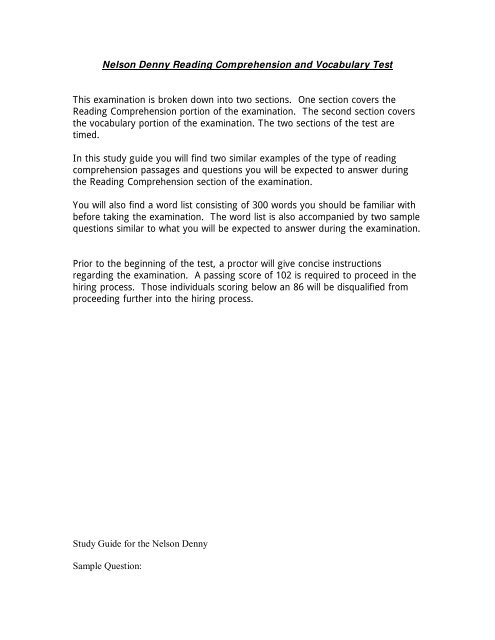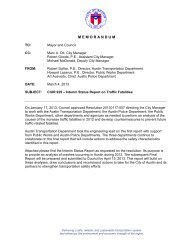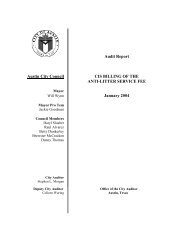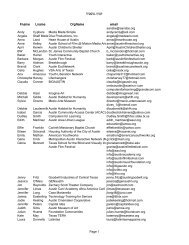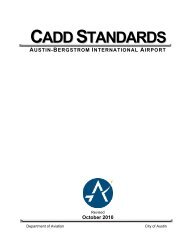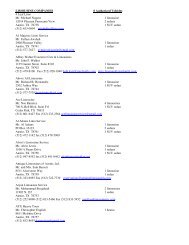Nelson Denny Reading Comprehension and Vocabulary Test This ...
Nelson Denny Reading Comprehension and Vocabulary Test This ...
Nelson Denny Reading Comprehension and Vocabulary Test This ...
You also want an ePaper? Increase the reach of your titles
YUMPU automatically turns print PDFs into web optimized ePapers that Google loves.
<strong>Nelson</strong> <strong>Denny</strong> <strong>Reading</strong> <strong>Comprehension</strong> <strong>and</strong> <strong>Vocabulary</strong> <strong>Test</strong><br />
<strong>This</strong> examination is broken down into two sections. One section covers the<br />
<strong>Reading</strong> <strong>Comprehension</strong> portion of the examination. The second section covers<br />
the vocabulary portion of the examination. The two sections of the test are<br />
timed.<br />
In this study guide you will find two similar examples of the type of reading<br />
comprehension passages <strong>and</strong> questions you will be expected to answer during<br />
the <strong>Reading</strong> <strong>Comprehension</strong> section of the examination.<br />
You will also find a word list consisting of 300 words you should be familiar with<br />
before taking the examination. The word list is also accompanied by two sample<br />
questions similar to what you will be expected to answer during the examination.<br />
Prior to the beginning of the test, a proctor will give concise instructions<br />
regarding the examination. A passing score of 102 is required to proceed in the<br />
hiring process. Those individuals scoring below an 86 will be disqualified from<br />
proceeding further into the hiring process.<br />
Study Guide for the <strong>Nelson</strong> <strong>Denny</strong><br />
Sample Question:
#1 Indispensable means: A. uncomfortable B. costly C. durable D. essential E. timely<br />
#2 If something atrophies, it: A. saves up B. wastes away C. wins D. develops E. moves<br />
<strong>Vocabulary</strong><br />
Explain<br />
Vulgar<br />
Elastic<br />
Copious<br />
Evoke<br />
Exaggerate<br />
Heedless<br />
Instill<br />
Similarities<br />
Garish<br />
Massive<br />
Credulity<br />
Boisterous<br />
Avidly<br />
Lapses<br />
Ensuing<br />
Tawdry<br />
Resources<br />
Brazen<br />
Blatant<br />
Quest<br />
Onerous<br />
Indispensable<br />
Resplendent<br />
Stultify<br />
Replication<br />
Usury<br />
Waft<br />
Whet<br />
Zealous<br />
Vilify<br />
Migration<br />
Ail<br />
Jovial<br />
Lyre<br />
Inscribe<br />
Indict<br />
Aggravated<br />
Dependence<br />
Delusion<br />
Militant<br />
Juncture<br />
Scant<br />
Peers<br />
Alter<br />
Implosion<br />
Partial<br />
Introspective<br />
Incursion<br />
Unequivocal<br />
Edifices<br />
Tasteless<br />
Abruptly<br />
Ascribe<br />
Grasp<br />
Avow<br />
Segments<br />
Quota<br />
Fulcrum<br />
Harrowingly<br />
Harrow<br />
Sparse<br />
Entreat<br />
Edit<br />
Sway<br />
Ethos<br />
Desist<br />
Extol<br />
Lurking<br />
Unworthy<br />
Mesh<br />
Surface<br />
Atonement<br />
Presumed<br />
Intoxicate<br />
Belligerent<br />
Resistance<br />
Cacophony<br />
Surplus<br />
Cohort<br />
Sensory<br />
Congregate<br />
Incentive<br />
Cordon<br />
Linear<br />
Covert<br />
Delayed<br />
Void<br />
Vessel<br />
Craven<br />
Insufficient<br />
Schemes<br />
Cower<br />
Degenerate<br />
Unscrupulous<br />
Credulous<br />
Induce<br />
Syndrome<br />
Deride<br />
Drudgery<br />
Disperse<br />
Placid<br />
Derision<br />
Prodigious<br />
Destitute<br />
Contaminate<br />
Vivid<br />
Despotic<br />
Recessive<br />
Dolt<br />
Wreak<br />
Leniency<br />
Emit<br />
Ailment<br />
Rigidity<br />
Ennui<br />
Fascinated<br />
Succulent<br />
Diversity<br />
Verbatim
Exigent<br />
Rampant<br />
Susceptible<br />
Fallacious<br />
Robust<br />
Foolhardy<br />
Feckless<br />
Glib<br />
Fracas<br />
Scathing<br />
Retention<br />
Foibles<br />
Surfeit<br />
Uncouth<br />
Gullible<br />
Curtailed<br />
Hapless<br />
Idiosyncrasy<br />
Obscure<br />
Hoodwink<br />
Sardonic<br />
Demise<br />
Iconoclast<br />
Pseudo<br />
Imbued<br />
Imbroglio<br />
Caricatures<br />
Mundane<br />
Blatantly<br />
Insipid<br />
Emulate<br />
Pungent<br />
Laud<br />
Lofty<br />
Mar<br />
Myopic<br />
Narcissist<br />
Overtly<br />
Obdurate<br />
Pith<br />
Quaff<br />
Rarefy<br />
Tyro<br />
Underling<br />
Venal<br />
Turmoil<br />
Torpor<br />
Undertaker<br />
Fearless<br />
Stress<br />
Dismal<br />
Confidential<br />
Value<br />
Aliens<br />
Grueling<br />
Pledge<br />
Lethal<br />
Interrogate<br />
Mute<br />
Affected<br />
Turbulent<br />
Gnome<br />
Competent<br />
Granted<br />
Lurk<br />
Recipient<br />
Ingests<br />
Obscene<br />
Persisted<br />
Deserve<br />
Entice<br />
Apothecary<br />
Opted<br />
Impetuous<br />
Regress<br />
Forestalled<br />
Romp<br />
Perplexed<br />
Adverse<br />
Replenishment<br />
Quench<br />
Vehemently<br />
Pomposity<br />
Impromptu<br />
Heinous<br />
Affronted<br />
Amnesty<br />
Cumbersome<br />
Libel<br />
Admonitions<br />
Devastation<br />
Enliven<br />
Illuminate<br />
Imperceptible<br />
Rational<br />
Provocative<br />
Foreshadowing<br />
Inevitability<br />
Perpetual<br />
Shackles<br />
Narcissism<br />
Berated<br />
Deplorable<br />
Intangible<br />
Irate<br />
Estrangement<br />
Virtuosos<br />
Prone<br />
Mayhem<br />
Ebb<br />
Inept<br />
Annotate<br />
Denote<br />
Subtle<br />
Invaluable<br />
Ruefully<br />
Assess<br />
Painstaking<br />
Advocate<br />
Mollifying<br />
Ethereal<br />
Lethargic<br />
Prolific<br />
Bequest<br />
Flippant<br />
Pallid<br />
Apathetically<br />
Ebullient<br />
Atrophies<br />
Nuances<br />
Menial<br />
Pugnacity<br />
Formidable<br />
Fatigued<br />
Enamored<br />
Dissect<br />
Countenance<br />
Famished
Apprized<br />
Aural<br />
Analyze<br />
Abstract<br />
Aesthetic<br />
Benevolent<br />
Capricious<br />
Complacent<br />
Conciliatory<br />
Devious<br />
Diligent<br />
Discernible<br />
Dogmatic<br />
Eccentric<br />
Fallacious<br />
Indifferent<br />
Inquisitive<br />
Meticulous<br />
Pertinent<br />
Plausible<br />
Reticent<br />
Morose<br />
Novice<br />
Obscure<br />
Ostentatious<br />
Precocious<br />
Prevaricate<br />
Querulous<br />
Quiescent<br />
Repose<br />
Repudiate<br />
Soporific<br />
Spontaneous<br />
Squ<strong>and</strong>er<br />
Theoretical<br />
Virulent<br />
Diverse<br />
Enigma<br />
Futile<br />
Gratuitous<br />
Hackneyed<br />
Incessant<br />
Insidious
<strong>Comprehension</strong> Sample Question<br />
Passage One<br />
Governments cost money – huge sums of money. Our federal government alone<br />
spends close to $250 billion each year. State <strong>and</strong> local governments spend many more<br />
billions. About 35 cents out of each dollar earned by all American workers <strong>and</strong> business<br />
firms goes as taxes to help pay costs of governments. From these figures you may get<br />
some idea of the enormous costs of the services <strong>and</strong> programs that our governments<br />
provide.<br />
What is this money spent for? In the early 1970’s the federal government spent<br />
from $75 billion to $80 billion each year for national defense. Space research <strong>and</strong><br />
technology took another $3 billion to $4 billion. Veteran’s benefits cost $8 to $12 billion.<br />
Interest on the national debt was over $20 billion per year. In addition, many billions of<br />
dollars were required for the federal government to help our states construct highways,<br />
housing, <strong>and</strong> community redevelopment projects. Federal aid to education <strong>and</strong> manpower<br />
training averaged over $10 billion annually.<br />
The huge costs of governments are of concern to every citizen. Americans have to<br />
pay the costs of government. We pay them with out taxes. We have a responsibility as<br />
concerned citizens to make sure that our governments spend our money wisely <strong>and</strong> spend<br />
it for worthwhile purposes.<br />
1. Which of the following federal programs was not mentioned?<br />
a. Retirement<br />
b. Research<br />
c. Redevelopment<br />
d. Education<br />
e. Housing<br />
2. State <strong>and</strong> local governments were said to spend___.<br />
a. $20 billion<br />
b. $3 billion to $4 billion<br />
c. $250 billion<br />
d. $35 billion<br />
e. an amount not given<br />
3. The best title for this passage would be<br />
a. Runaway Spending<br />
b. Government Spending<br />
c. Federal Wastefulness<br />
d. The National Debt<br />
e. Federal Taxes<br />
4. The Federal government apparently does not help the states in the area of ___.<br />
a. Education<br />
b. Manpower training<br />
c. Housing<br />
d. Public safety<br />
e. Redevelopment
Passage Two<br />
Economics is a study of the process by which we make <strong>and</strong> spend our incomes. It<br />
is also defined as a study of how man satisfies his wants <strong>and</strong> needs for economic goods<br />
<strong>and</strong> services. Even more specifically, economics is a study the process by which man<br />
attempts to get the most satisfaction possible when he cannot buy all of the goods <strong>and</strong><br />
services that he would like. The inability of man to buy all of the goods <strong>and</strong> services that<br />
he would like is often referred to as the economic fact of scarcity. Economics, then, is<br />
concerned with the production, distribution, <strong>and</strong> consumption of goods <strong>and</strong> services.<br />
Economic activity at a given time includes everything that is being done to satisfy<br />
man’s wants <strong>and</strong> needs through production, distribution, <strong>and</strong> consumption. Management,<br />
labor, <strong>and</strong> government all contribute to economic activity through which man’s wants<br />
<strong>and</strong> needs are satisfied. The end results sought through economic activity are: (1) the<br />
creating of economic goods <strong>and</strong> services for man’s use; <strong>and</strong> (2) the providing of<br />
opportunities for man to earn a reasonable income so he can acquire <strong>and</strong> consume the<br />
goods <strong>and</strong> services he wants <strong>and</strong> needs.<br />
5. Economics was definitely said to involve______.<br />
a. Making a living<br />
b. Satisfying our needs<br />
c. Paying taxes<br />
d. Planning a budget<br />
e. Making investments<br />
6. The passage mentions______.<br />
a. Scarcity<br />
b. Surplus<br />
c. Depression<br />
d. Inflation<br />
e. Taxes<br />
7. The purpose of this passage is _______.<br />
a. To arouse interest<br />
b. To entertain<br />
c. To criticize<br />
d. To make clear<br />
e. To warn<br />
8. Chief emphasis is on the______.<br />
a. How<br />
b. Where<br />
c. When<br />
d. What<br />
e. Why<br />
<strong>Reading</strong> <strong>Comprehension</strong> Answer: 1. A, 2. E, 3. B, 4. D, 5. B, 6. A, 7. D, 8. A<br />
<strong>Vocabulary</strong> Answer: 1. D, 2. B


